|
|
|
Hiding Jimmy Hoffa
The Agony Column for April 29, 2002
Commentary by Rick Kleffel

|
|
|
The Agony Column for April 29, 2002
Commentary by Rick Kleffel

Everything around us seems to be a delivery system for something else. That picture of the nice-looking man holding (presumably) his child's hand as they stroll across the playground is telling us to ask our doctor for very specific allergy medication. The newscaster who just spoke words about the arrests of several more potential terrorists is dropping a heavy-handed hint for the government that ordinary citizens such as the viewers best keep in line lest we end up in harm's way. That laughing guy in the shower isn't espousing the virtues of cleanliness ("It's just before godliness!" he would exclaim), he's selling soap and sex. The triumphant survivor of the chainsaw massacre is a spokesperson for the power of women. Nothing I've yet said has anything to do with books -- but it all has everything to do with books.
Language was the first, the best, and is still the cheapest meme-delivery system out there. We all speak with a forked tongue, we're all lying for the devil, if not actually the devil himself, incarnate for a moment in the sputtering, fibbing frame of human flesh. While I claim to be the Editor of this column, we're all editorializing all the time. It's all slant and cant. Even if you just look at the data.
 |
|
Disputed data got a lot of slant and cant after the last presedential election. |
The problem is that you can't just look at the data. Somebody has to assemble it, either you or some trusted expert. We all intuitively know that the experts we trust are editing the hell out of every bit, byte and megabyte. We're paying them to do that (or not, as is the case with this column). Now, I love to editorialize, I do it for the sheer joy of filling in the blank screen each morning. And it's pretty clear that I'm doing so, and even my concealed motives are wearing the sheerest of veils. Part of this column at least will go to show how much fun you (or in this case, I) can having Editorializing wit h the Database.
Instead of doing what I should have done, getting ahead of schedule and having columns complete a day or so before they are (according to my self-imposed schedule) supposed to run, I've been creating a sort of simple database from the 135 reviews I currently have posted to this site. (Make that 137 with today's two additions.) My hope is that it will give readers a much better tool for finding books that they'd like that they might otherwise never come upon. This is because I've fudged the data I entered in the database. I've stretched the truth, early and often, and I've enjoyed the snapping sound it makes when it finally gives way. That's where the real discoveries lie.
What I've done is to pigeonhole the works I've reviewed into one of six genres. (Or as we call them in the Information Services business, buckets.) Well, usually not just one. I've editorialized the data. I'm admitting this now, so that my actual agenda can be buried under the revelation of my hidden agenda. Got that?
There are now six Indexes in addition to the Review Archive. Well, actually seven, if you count the Index of Indexes. From the home page, if you go to the page now described as the Archive, you'll see the Master Index. At the top is the Genre Guide; you can click on one of the six little abbreviations and go to an index containing only works I'm suggesting belong in any one of the six genres, sorted by the author's last name. Or, you can go to the Review Archive, which has all the works I've reviewed sorted by the author's last name. Each entry in any Index gives the author's name (Last, First Middle), followed by the work's title, and linked abbreviations showing the genres that (I think) apply to the works. The genres a work is tagged with are given in the order I think they apply, so there are two levels of information in my pigeonholing process.
In each review, the writer's name is linked to his entry in the Review Archive, where you can see all the books by a particular writer. The genres I have assigned a book to are linked to that writer's works in that genre. From there, you can see the whole list of books and authors reviewed in that genre. The idea is that the reader can jump from one writer's work in one genre, to his work in another genre, then looking at that new genre, find new writers of potential interest. You can go through more than six degrees of separation or far fewer to get from Stephen King to John Keel to George Dyson. Hopefully, readers willbe able to find more books that they would enjoy -- and avoid books that they wouldn't -- by jumping around between categories.
And the Genres are...
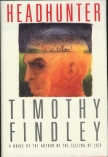 |
|
Timothy Findley offers something for everyone, at least, according to me. Your Mileage May Vary.... |
General Fiction (G) -- "Non-Genre, general fiction and literature." Sort of the default, doesn't fit anywhere else genre. The all-or-none-of-the-above genre. It's pretty sparse, really, and there's nothing in here that doesn't have at least a double whammy. Heck, Timothy Findley's 'Headhunter' gets four, and it deserves every one of them. Findley's a Canadian author, who for by reason of being Canadian (I'm guessing) doesn't get the notice in the states that he deserves. It could also be because his books are remarkably hard to pigeonhole. 'Headhunter' is a surreal tale based on Joseph Conrad's 'Heart of Darkness' (general fiction and literature) about a woman at a psychiatric institute who inadvertently sets Colonel Kurtz free from page 92 of the novel (fantasy, of course), in a Toronto beset by a mysterious plague (horror). She's trying to find him, as where he might be is a mystery. So it's a pretty 'tweeny' book, and a very good one. It might appeal to a wide range of readers, if they ever managed to connect to it. Similarly, readers of General Fiction and literature might otherwise miss out on John Clute's ultra-literary, ultra-radical 'Appleseed' -- much to their dismay.
 |
 |
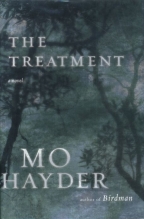 |
|
Phil Rickman uses supernatural devices and is usally classified as horror, but his work has more the feel of mystery. |
When one says "horror", this is the name usually associated with the word. 'Bag of Bones' was a more adult book for King's newest publisher. |
Mo Hayder masquerades as mystery, but will probably succeed in scaring the crap out of the reader. |
Horror (H) -- "Supernatural fiction, supernatural horror and non-supernatural horror." This is by far the bucket with the most records, and with a nebulous definition like that, it's no wonder. Lots of readers who like horror fiction -- fiction designed to "scare the crap out of you" -- also like fiction that is not designed to "scare the crap out of you", but uses the same elements as much horror fiction, in particular, supernatural devices. Phil Rickman is the Poster Man for non-horrific supernatural fiction. He uses many of the devices, but his work like 'The Cure of Souls' have most of the elements and drives of a mystery. The books are not there to scare you or gross you out, they're there to draw a dense, tangled, intense picture that slowly becomes clearer. But horror readers like that sort of stuff as well, and so it gets called horror, though in many ways it is simply mystery. And what about stuff that has not one whit of the supernatural, but manages to scare the crap out of you? That's horror as well (in my book, though you might find in the MegaSmegaBookstore right alongside Raymond Chandler (who wrote some pretty horrific stuff himself.) The Poster Man for that little neighborhood is of course, Thomas Harriss, though since you don't need to hear about him from me, in my DB you'll need to look at Mo Hayder ('Birdman', 'The Treatment'), Kathe Koja (the superlative 'Bad Brains') or Magnus Mills ('The Restraint of Beasts') to get a similar buzz.
 |
 |
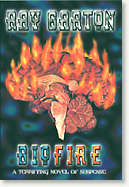 |
|
It looks like SF, it reads like alternate history, but it's true -- George Dyson's story ignites hope in space exploration enthusiasts even now. |
Simon Clark's 'The Fall' uses time travel and other very science fictional ideas to put a new spin on horror, while using horror to put a new spin SF. |
Ray Garton's brain-on-fire 'Biofire' is the kind of novel that looks like horror but is really science fiction, with lots of sex and gore. |
Science Fiction (SF) -- "Science fiction, science fantasy, speculative fiction, alternate history." As soon as you see the 'speculative fiction', you know I've made this well-populated category pretty squishy. Sure, there's a fair number of records that are solely SF and easily identifiable as such. Most of them probably have pictures of spaceships on the cover. But then, there are books like 'Project Orion: The True Story of the Atomic Spaceship', which is, uh, non-fiction. But it sounds like an SF story, and it would certainly appeal to a wide swathe of the SF audience. And horror writers Simon Clark and Ray Garton both have entries, because, in the process of scaring the crap out of their readers, they've taken some ideas from the SF Writers toolbox. But there are a surprising number of entries that are strictly SF. I may go back and revise some of them, to even out the distribution. 'Speculative Fiction' can cover a multitude of sins.
 |
 |
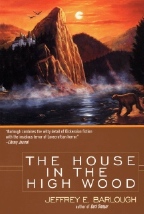 |
|
Here's what you typically think of when one says fantasy. I've read all three Barclay books and I've rather enjoyed his gritty, unpleasant take on the genre in 'Dawnthief'. |
Horror writer Mark Chadbourn gives his own horrific spin on 'elves' in his 'World's End' series. If you look closely, you might be able to tellt hat the dragon is sitting on a freeway. |
Jeffrey Barlough writes some really, really weird stuff that's really, really good. His Dunsanian, sunny world is shot through with veins of icy horror. |
Fantasy (F) -- "Fantasy, surrealism and magic realism." Now the usual take on fantasy is that it's elves and sorcerers in the tradition of Tolkein. Of late that has been expanded somewhat. Good thing, too, since I don't read many elves and sorcerers books. Eventually I'll review some I did read recently by James Barclay. In the interim, it's another blanket over sins. Probably the closest to actual fantasy are works that don't even get listed as 'Fantasy' first that is, the books of Mark Chadbourn's 'World's End' series. At least they have elves, though they're the most un-elf-like elves you've ever seen. But where else can Iput the exquisite books by Jeffrey Barlough? 'The House in the High Wood' is wonderfully fantastic, and has all the charm of the best Lord Dunsany, stories for sunny day. Alas, one cannot ignore the intensely poisonous pill Barlough passes in his narrative that brings it back into the world of Horror.
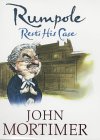 |
 |
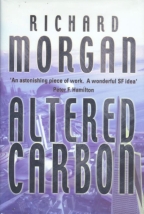 |
|
I just ordered the latest Rumpole collection from the UK, since I was tired of waiting for it to show up here. It's pretty much an actual, normal mystery. |
I had to scan my own copy of this book to avoid the odious movie advertisement that the cover has become. Don't judge the book by the movie! |
Richard Morgan's very scince fictional 'Altered Carbon' is, uh, shot through and through with icy veins of mystery. Yep, that's it. |
Mystery (M) --"Crime, thrillers, mystery, suspense." That's pretty straightforward, isn't it? Except where it crosses over with horror, so that works which might otherwise seem to be whodunits are turned into stomach churning journeys of discovery. Or, when they're not fictional at all, but merely, but even worse, true. Don't hate 'A Civil Action' because it was a movie. Love it because it's a fantastic book and a page-turning mystery that happens to be at least purportedly true. And what about hardcore science fiction novels like Richard Morgan's fantastic 'Altered Carbon' that read like Raymond Chandler? Though it is set in the 26th century, the motives are straight out of Gumshoe Lit 101.
 |
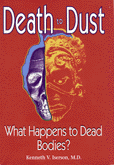 |
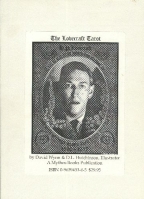 |
|
Not surprisingly, this supposedly true book reads much like what might be called an 'occult thriller'. |
Attention all horror writers! If you have not yet bought Kenneth Iserson's 'Death to Dust', you'd best do so. Everything you want to know about death is nicely orgtanized for your convenience. Make that gore all too realistic! |
OK, the Lovecraft Tarot. I mean, it's not even a book, it's not fiction, but it is, in a non-fictional sense, a tarot deck. Thus its inclusion in the non-fiction genre list. |
Non-Fiction (NF) -- "Non-Fiction, True Crime, Forteana, Reference." Well, you might hope that all the books in this category are non-fiction. Once you read the list, you might want to change your mind. If 'Psychic Warrior' is true, then we're not living in the world that everyone thinks we're living in. That sub-category 'Forteana' will certainly cover another, entirely separate multitude of sins. Taken from Charles Fort, a failed fiction writer who became wildly popular and culturally significant when he published a book of newspaper clippings called 'The Books of the Damned', he was the original Fox Mulder. A number of the books reviewed here are dropped into categories like horror or mystery so that writers in these genres who happen to read these pages might find a new source of inspiration. Or, as in the case 'From Death to Dust', pure data for reference. And where else can I put my review of 'The Lovecraft Tarot' by David Wynn, illustrated by D. L. Hutchinson, a pack of Tarot cards based on the works of H. P. Lovecraft?
 |
|
Childproofing the house caused me to help a celebrity to move on in the world..... |
And where is Jimmy Hoffa hidden in this column, you might ask? Well, He was in the coffee table we used to have. It was a huge, coffee table, with an unusual design. It was just a large, heavy-as-hell box covered in cheap veneer. It should have been light as a feather, but it was perfectly sized to hold Hoffa. We kept this decorative coffin table in our living room for many years, until our kids were able to grab stuff from it. When it came to the point that the coffee table books were spending more time off the table than on, we decided to send Jimmy on the next leg of his journey. And the coffee table book collection suffered as a result. Well, the kids are now at the point where they'd just cover up the coffee table with their crap, and we've become accustomed to living without one. So I have to put 'Saucer Attack!' on any flat surface I can find. And you should too. It's one of the most compelling CTB's I've ever come across.
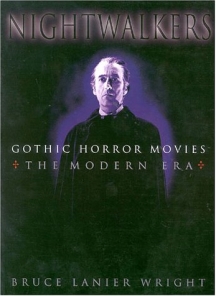 |
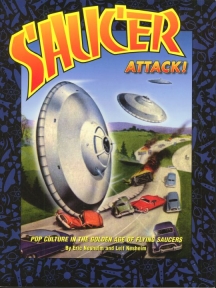 |
|
Bruce Wright's 'Nighwalkers' looks at Gothic horror movies. Everybody you know who loves horror movies will love this book. |
A really weird and esoteric subject turns out to be fascinating book -- 'Saucer Attack!' |
It's not just me who thinks so, either. The whole family loved this book., which came at the recommendation of Bruce Wright, himself the author excellent horror movie compendium 'Nighwalkers'. 'Saucer Attack' simply lays out a series of book covers, comic book covers, magazine covers and movie posters depicting Flying saucers about to attack. It covers just a tiny part of a tiny slice of history, but does it so well, so compellingly that you'll be captivated, not just once, but every time you glance in it's general direction. Do yourself a favor and pick up 'Saucer Attack' and 'Nightmare Movies' as coffee table cover. You just can't go wrong with subject matter this ripe.
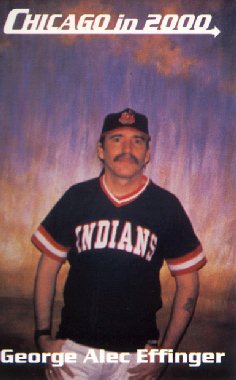 |
|
George Alec Effinger -- January 10, 1947 - April 27, 2002 |
Finally, to end this column on a somber note, George Alec Effinger, covered in this column a week ago, passed away on April 27, 2002. His wonderful Marid Audran novels certainly lightened my life. The best thing you can do is to pick one of his books and read it. His life shines through each and every word he wrote.
Thanks,
Rick Kleffel